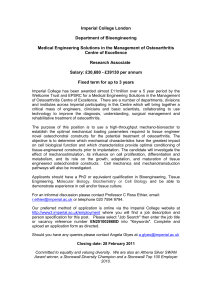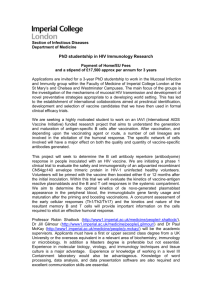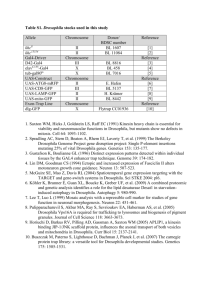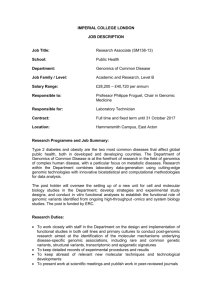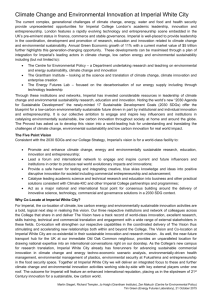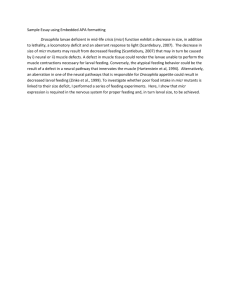Job Title: Research Associate - Workspace
advertisement
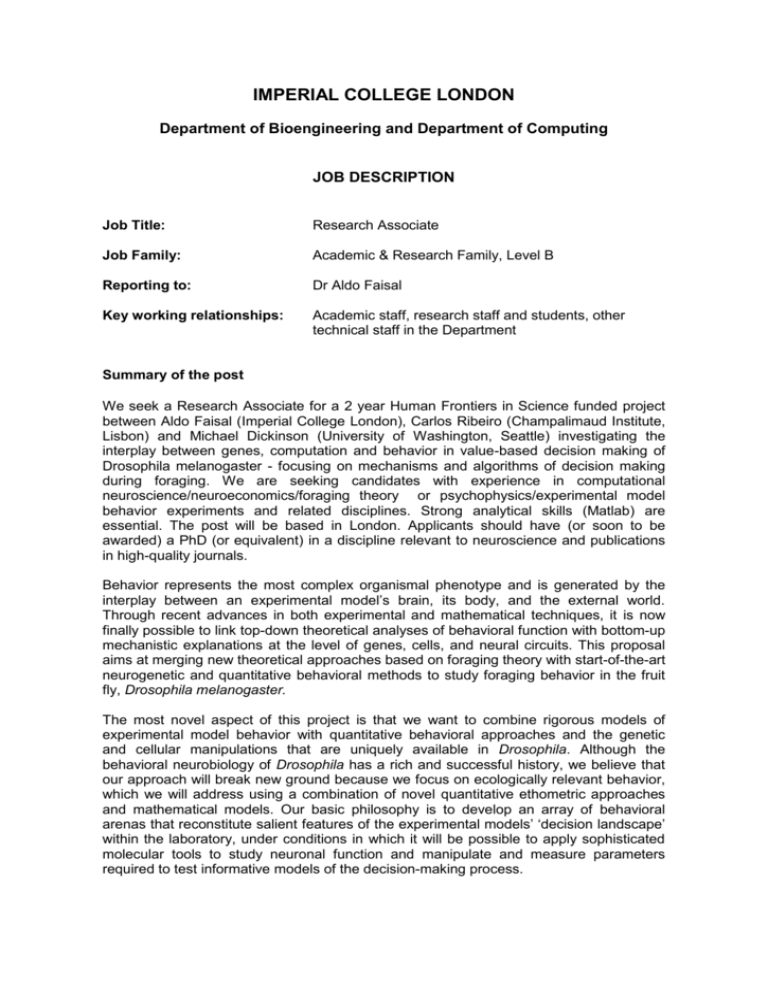
IMPERIAL COLLEGE LONDON Department of Bioengineering and Department of Computing JOB DESCRIPTION Job Title: Research Associate Job Family: Academic & Research Family, Level B Reporting to: Dr Aldo Faisal Key working relationships: Academic staff, research staff and students, other technical staff in the Department Summary of the post We seek a Research Associate for a 2 year Human Frontiers in Science funded project between Aldo Faisal (Imperial College London), Carlos Ribeiro (Champalimaud Institute, Lisbon) and Michael Dickinson (University of Washington, Seattle) investigating the interplay between genes, computation and behavior in value-based decision making of Drosophila melanogaster - focusing on mechanisms and algorithms of decision making during foraging. We are seeking candidates with experience in computational neuroscience/neuroeconomics/foraging theory or psychophysics/experimental model behavior experiments and related disciplines. Strong analytical skills (Matlab) are essential. The post will be based in London. Applicants should have (or soon to be awarded) a PhD (or equivalent) in a discipline relevant to neuroscience and publications in high-quality journals. Behavior represents the most complex organismal phenotype and is generated by the interplay between an experimental model’s brain, its body, and the external world. Through recent advances in both experimental and mathematical techniques, it is now finally possible to link top-down theoretical analyses of behavioral function with bottom-up mechanistic explanations at the level of genes, cells, and neural circuits. This proposal aims at merging new theoretical approaches based on foraging theory with start-of-the-art neurogenetic and quantitative behavioral methods to study foraging behavior in the fruit fly, Drosophila melanogaster. The most novel aspect of this project is that we want to combine rigorous models of experimental model behavior with quantitative behavioral approaches and the genetic and cellular manipulations that are uniquely available in Drosophila. Although the behavioral neurobiology of Drosophila has a rich and successful history, we believe that our approach will break new ground because we focus on ecologically relevant behavior, which we will address using a combination of novel quantitative ethometric approaches and mathematical models. Our basic philosophy is to develop an array of behavioral arenas that reconstitute salient features of the experimental models’ ‘decision landscape’ within the laboratory, under conditions in which it will be possible to apply sophisticated molecular tools to study neuronal function and manipulate and measure parameters required to test informative models of the decision-making process. The post offers the possibility to conduct cross-disciplinary work, enabling experimentally trained candidates to learn and apply advanced modeling techniques or theoretically included candidates to conduct experiments or a mixture of both. Data-collection involving high-throughput behavior tracking experiments in wild-type and mutants is already underway as part of the project and the researcher may conduct further experiments or focus on data analysis and modeling or a mixture of both. Key Responsibilities: Driving a research agenda focussing on a fundamental biological question in a goaloriented manner Depending on the candidate, either mathematical or numerical modelling of Drosophila decision making behaviour or design and execution of Drosophila behavioural experiments or a mixture of both Drafting of scientific manuscripts and grant proposals Research presentations at scientific conferences and meetings Good research practice Active participation in laboratory group meetings Active collaboration with other researcher and research groups at Imperial and throughout the UK and US Training of new starters as required Assist other researchers on troubleshooting techniques/methods as required General: Organisation of work output to meet research project deadlines and to support research project objectives. Adjustment of priorities as necessary to accommodate new workloads or change in circumstances or problems Effective communication with other members of technical, academic and research staff, and external contacts Making recommendations and actively contributing to the continual improvement of the operation of the laboratory To observe and comply with all College policies and regulations, including the key policies and procedures on Confidentiality, Conflict of Interest, Data Protection, Equal Opportunities, Financial Regulations, Health and Safety, Imperial Expectations (for new leaders, managers and supervisors), Information Technology, Private Engagements and Register of Interests, and Smoking. To undertake specific safety responsibilities relevant to individual roles, as set out on the College Website Health and Safety Structure and Responsibilities page (http://www3.imperial.ac.uk/safety/policies/organisationandarrangements). Job descriptions cannot be exhaustive and the post-holder may be required to undertake other duties, which are broadly in line with the above key responsibilities. Imperial College London is committed to equality of opportunity and to eliminating discrimination. All employees are expected to adhere to the principals set out in its Equal Opportunities in Employment Policy, Promoting Race Equality Policy and all other relevant guidance/practice frameworks. PERSON SPECIFICATION Applicants are required to demonstrate that they possess the following attributes. Imperial Expectations These are the 7 principles that Imperial leaders, managers and supervisors are expected to follow: 1) Champion a positive approach to change and opportunity 2) Communicate regularly and effectively within, and across, teams 3) Consider the thoughts and expectations of others 4) Deliver positive outcomes 5) Encourage inclusive participation and eliminate discrimination 6) Support and develop staff/colleagues to optimise talent 7) Work in a planned and managed way Qualifications Educated to a minimum of a Doctorate level, or in the process of nearly completing a Doctorate, or equivalent in Neurobiology/Neuroscience, Computational Neuroscience, Mathematical biology, Physics, or related field Experience and knowledge: Demonstrable experience in Neurobiology/Neuroscience or Mathematical modelling techniques Demonstrable experience working at the interface between theory and experiments in the natural sciences Demonstrable experience of working in a laboratory at a similar level, preferably in an institute of higher education Knowledge of modern, sophisticated data analysis techniques Knowledge of health and safety issues in a laboratory environment and experience of enforcing compliance Experience organising own work schedule with minimum supervision Skills and abilities: Excellent problem solving abilities Excellent verbal and written communication skills with the ability to produce clear and concise written material Strong analytical skills Self-motivated, innovative, enthusiastic and pro-active Self-confident and articulate with the ability to communicate confidently and effectively with College staff at all levels as well as students A pro-active approach to health and safety Good IT skills including spreadsheet and database applications Able to perform effectively under pressure of deadlines with good personal organisation and time management skills Collaborative and able to build and sustain working relationships Willingness to travel, possibly internationally on occasion, to conferences and meetings, and collaborators Willingness to undertake any necessary training
